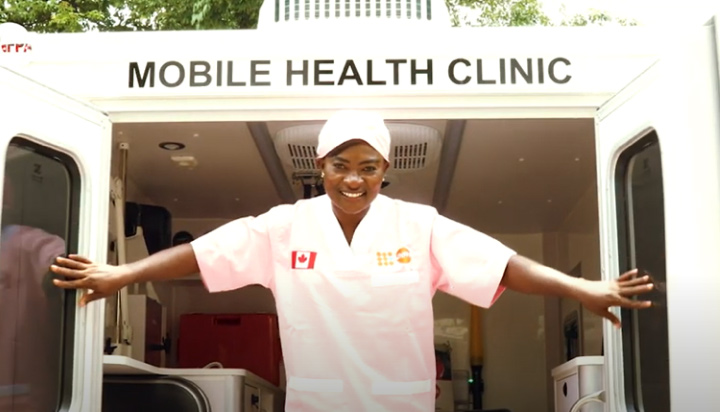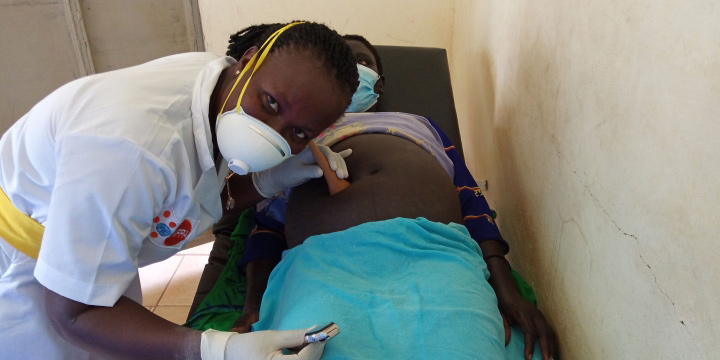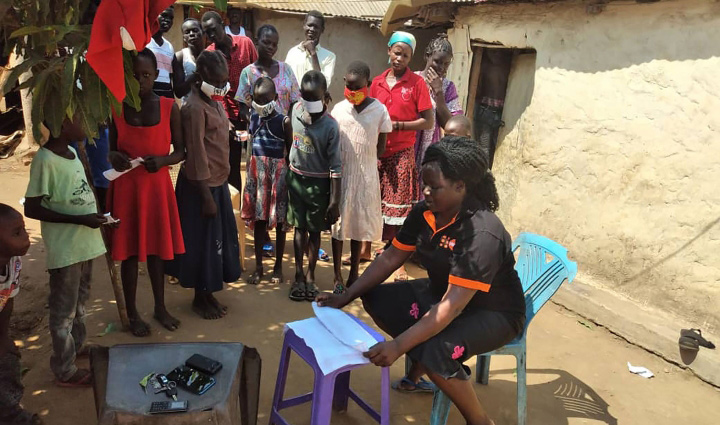Midwives save lives through thick and thin


A midwife opens the doors to a mobile health clinic to provide healthcare to her patients.
Photo: UNFPA DRC
The bustling streets of Kinshasa, Democratic Republic of Congo (DRC), went quiet when COVID-19 forced the city into lockdown in March, 2020.
But as mothers from all corners of the globe know well, if there is one thing a pandemic can’t stop, it’s the arrival of a baby who is ready to enter the world. With movement restrictions making it harder than ever to access health services, expectant mothers in Kinshasa and in many developing countries face increased uncertainty about giving birth safely.
Midwives are on the front lines, adapting their services so that women continue to get the care they need. Working with the United Nations Population Fund (UNFPA), midwives with the DRC Midwifery Association have gone into Kinshasa’s streets in mobile health clinics equipped to bring care to their patients.
With realities like no running water, limited electricity and patients who may not be able to pay, the task of providing midwifery care in developing countries was already daunting, forcing midwives to innovate and come up with solutions.

“Then COVID comes along,” says Kirsty Bourret, a Canadian midwife who has worked alongside midwives in the DRC and Haiti through development programming supported by Global Affairs Canada (GAC). She explains that the emphasis on treating COVID-19 over other health concerns means that many women’s health issues, like limited access to contraception and the prevalence of gender-based violence, are now compounded, making midwives’ jobs even more challenging.
“And then there’s the fact that most of these midwives are women,” she adds. “There is a household and economic burden that many midwives are now having to manage in addition to everything else.” For example, they may have husbands that are out of work, and children who are no longer in school to care for, all while continuing their life-saving work.

Despite all this, midwives are among the strongest advocates for continued access to women’s health, and they are finding creative ways to stay connected to the communities they serve. The South Sudan Nurses and Midwives Association is using teleconsulting, radio and information sessions to get the word out. They have also adjusted their facilities for physical distancing and are teaching mothers about effective handwashing and using masks.
Canada has been working with countries like South Sudan to strengthen the midwifery profession for years. For example, with support from Canada and other donors, South Sudan has increased the number of trained midwives from approximately 8 to 800 over the past decade.
The World Health Organization estimates that with enough midwives trained to international standards, global maternal deaths, stillbirths and neonatal deaths would be reduced by 80%. Both cost-effective and culturally sensitive, midwives also provide other life-changing care, from access to contraception to case referrals for gender-based violence.
In the current environment, many midwives are going beyond women’s health to also promote life-saving information about water, hygiene, sanitation and how to prevent the spread of COVID-19.
Ma Shwe Wutt Hmon is sharing information about the COVID-19 virus in her Myanmar community. A mother of two, she goes door to door to distribute pamphlets in her village and nearby villages. For those who cannot read, she reads the information to them.
A key part of GAC’s midwifery programming has been strengthening midwifery associations. These organizations provide a standard of care and advocate for women’s health, for midwives and the midwifery profession. With expertise from organizations like Cuso International, the Canadian Association of Midwives (CAM) and the United Nations Population Fund, Canada has helped bolster these organizations in a number of countries, and the investment is now paying off: the trained, passionate midwives who make up these organizations are now advocating for women's health, and are finding new and innovative ways to bring care to mothers in the current crisis.

Midwife Ma Shwe Wutt Hmon, who was trained through World Vision Canada’s GAC-funded ENRICH program, provides COVID-19 information sheets to people in her community.
Photo: World Vision Canada
When asked what has struck her most about the impact of Canada’s support of midwives, CAM midwife Kirsty Bourret says that it’s confidence.
“It has really helped midwives to understand their value as health care professionals and their ability to impact sexual and reproductive health in their countries,” she says. “When you have that confidence in yourself and you understand your value and your place, you are going to mobilize yourself in the most extenuating of circumstances because you believe not just in what you can provide, but in what midwifery can.”- Date Modified: